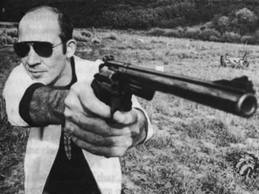Can you improve on F Scott Fitzgerald’s improving reading list?
Fitzgerald thought he’d prescribed 22 essential books to his nurse.

Uh, wow
After reading this articel I came to the conclusion that I have a lot of catching up to do according to Mr. Fitzgerald from this article found in The Guardian. Then I thought about the matter of context and source.
Would other contemporaries of Mr. Fitzgerald put together this list? Or something even remotely similar? What about the hottest author of today, J. K. Rowling? Would her list be even remotely similar? I doubt it very much.

Then there’s my favorite writer Charles Bukowski. Would he have a list? Would he give it to you? Would he even give a shit about an improvement list? Somehow, I kinda doubt it, he might throw you a snippet or two, ask you to buy him a beer, or a fist-fight.
“How in the hell could a man enjoy being awakened at 6:30am by an alarm clock, leap out of bed, dress, force-feed, shit, piss, brush teeth and hair, and fight traffic to get to a place where essentially you make lots of money for somebody else and were asked to be grateful for the opportunity to do so?” – Charles Bukowski

Hunter S. Thompson, an improved reading list, haha, wow! how about an improved cocktail list, or an improved list of drugs? Or, better yet, how about an improved list of drug cocktails. I doubt doling out this kind of info was his style.

What about this guy?
Or this guy?
Hmmm, there seems to be a theme with the guys that I’ve read a lot. So be it. Well I did read a lot of this guys stuff also.
Anyway, I have digressed, to a degree, but maybe I haven’t. When I first looked at this article I thought the list was pretty important stuff, and there was a need to look at it strongly, but the more I looked the more it became apparent to me that this list is about context.
The list is a snapshot in time. The time in F. Scott Fitzgerald’s life, and his window in what was important for improvement. It’s a list worth looking at and borrowing from and a nice peek into the mind of a literary giant. For that alone it’s a good read and a great list
For what it’s worth a few years back some college students ask me to put together a list of books I thought that landscape designers should read, or take a look at. I posted a page on Squidoo for that very list to have a home and having put some real thought into it I came up with 27 books over a variety of topics that have helped me become a better designer.
I wonder what Bukowski would think of Squidoo???
The Fitzgerald story from the Guardian
It was 1936, one of the most difficult periods in F Scott Fitzgerald‘s life: he had just published his essay The Crack-Up in Esquire magazine, exploring the mental and physical decline that would lead to his death four years later.
As he convalesced in a North Carolina hotel, his thoughts turned to choosing 22 books that might educate his nurse Dorothy Richardson, while perhaps distracting her from her attempts to keep him sober. There’s no record of whether she felt encouraged or patronised by this literary guidance.
Three volumes of introspection from Marcel Proust’s À La Recherche du Temps Perdu were offset a single laugh-along volume of The Best American Humorous Short Stories. Should Richardson find Tolstoy’s War and Peace hard going, she could console herself with the wit of Oscar Wilde, or the piquant brevity of Katherine Mansfield’s short story “The Garden Party”.
In his essay, Fitzgerald described the depths of the distress he’d suffered when, “10 years this side of 49, I suddenly realised I had prematurely cracked”
He wrote: “Now a man can crack in many ways – can crack in the head, in which case the power of decision is taken from you by others; or in the body, when one can but submit to the white hospital world; or in the nerves …”
“I realised that in those two years, in order to preserve something – an inner hush maybe, maybe not – I had weaned myself from all the things I used to love – that every act of life from the morning toothbrush to the friend at dinner had become an effort.”
One can’t help wondering how much of this cracked-up self he glimpsedGardner Murphy‘s An Outline of Abnormal Psychology, or how much melancholy fellowship he found in the Complete Poetical Works of John Keats, particularly perhaps, the haunting sonnet “When I have fears that I may cease to be”.
Perhaps the most heartening feature of the list is what it reveals about the range and energy of his reading: here was a man who could wax lyrical about plays, poetry, fiction and non-fiction. Here’s his list. Which books would you add (or subtract)?
Sister Carrie, by Theodore Dreiser
The Life of Jesus, by Ernest Renan
A Doll’s House, by Henrik Ibsen
Winesburg, Ohio, by Sherwood Anderson
The Old Wives’ Tale, by Arnold Bennett
The Maltese Falcon, by Dashiel Hammett
The Red and the Black, by Stendhal
The Short Stories of Guy de Maupassant, translated by Michael Monahan
An Outline of Abnormal Psychology, edited by Gardner Murphy
The Stories of Anton Chekhov, edited by Robert N Linscott
The Best American Humorous Short Stories, edited by Alexander Jessup
Victory, by Joseph Conrad
The Revolt of the Angels, by Anatole France
The Plays of Oscar Wilde
Sanctuary, by William Faulkner
Within a Budding Grove, by Marcel Proust
The Guermantes Way, by Marcel Proust
Swann’s Way, by Marcel Proust
South Wind, by Norman Douglas
The Garden Party, by Katherine Mansfield
War and Peace, by Leo Tolstoy
John Keats and Percy Bysshe Shelley: Complete Poetical Works


